|
|
|
Sort Order |
|
|
|
Items / Page
|
|
|
|
|
|
|
| Srl | Item |
| 1 |
ID:
173775
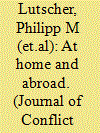

|
|
|
|
|
| Summary/Abstract |
In this article, we study the political use of denial-of-service (DoS) attacks, a particular form of cyberattack that disables web services by flooding them with high levels of data traffic. We argue that websites in nondemocratic regimes should be especially prone to this type of attack, particularly around political focal points such as elections. This is due to two mechanisms: governments employ DoS attacks to censor regime-threatening information, while at the same time, activists use DoS attacks as a tool to publicly undermine the government’s authority. We analyze these mechanisms by relying on measurements of DoS attacks based on large-scale Internet traffic data. Our results show that in authoritarian countries, elections indeed increase the number of DoS attacks. However, these attacks do not seem to be directed primarily against the country itself but rather against other states that serve as hosts for news websites from this country.
|
|
|
|
|
|
|
|
|
|
|
|
|
|
|
|
| 2 |
ID:
173771
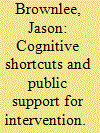

|
|
|
|
|
| Summary/Abstract |
Scholars of public opinion on military intervention agree that survey respondents make judgments from limited information. Yet researchers still question whether ordinary Americans reflect elite attitudes or instead reach their own “pretty prudent” conclusions from the stated principal policy objective (PPO). This article adjudicates the debate while incorporating lessons from the study of bounded rationality. Evidence comes from an original data set of aggregate US public opinion, covering 1,080 nationally representative survey items about launching operations, across thirty-five countries, during 1981 to 2016. Tests show that PPO matters: pursuing “internal policy change” is less popular than restraining international aggression. However, language reflecting White House cues and one prominent cognitive shortcut (the “availability heuristic”) statistically and substantively outperforms PPO at predicting intervention support. The results indicate that when ordinary Americans are polled about using force against salient foes (Saddam Hussein, al-Qaeda, Islamic State in Iraq and Syria), elements of bounded rationality can overtake the prudence expressed toward less vivid problems.
|
|
|
|
|
|
|
|
|
|
|
|
|
|
|
|
| 3 |
ID:
173770
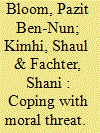

|
|
|
|
|
| Summary/Abstract |
Moral dilemmas amid war on terrorism include repeated harsh moral choices, which often pose threats to one’s moral image. Given that people strive to view themselves as moral, how do they cope with such morally compromising decisions? We suggest and test two strategies to cope with morally threatening decision-making under in-group moral responsibility amid war on terrorism: (a) trivialization of the moral dilemma and (b) resentment toward the target. Four experimental studies measured (study 1) and manipulated (studies 2–4) these hypothesized mechanisms, presenting a similar collateral damage dilemma to Israeli Jews in the context of the 2014 Gaza conflict (studies 1 and 2) and to Americans in the context of the US campaign against Islamic State of Iraq and Syria (ISIS) (studies 3 and 4). Results demonstrate that both trivialization and resentment facilitate harsh moral choices under conditions of moral accountability. Studying the mechanism underlying moral decision-making in conflicts is key to understanding moral injury and the process of moral repair.
|
|
|
|
|
|
|
|
|
|
|
|
|
|
|
|
| 4 |
ID:
173772
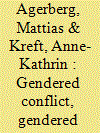

|
|
|
|
|
| Summary/Abstract |
Sexual violence (SV) in conflict is increasingly politicized at both the international and domestic levels. Where SV in conflict is prevalent, we argue international actors perceive gender to be salient and push for a gendered response. Simultaneously, women mobilize politically in response to the threat to their security that conflict-related SV constitutes, making demands for greater representation in politics with the goal of improving societal conditions for themselves. Jointly, we theorize the pressures from above and below push governments in conflict-affected states toward adopting gender policies. We test this theoretical framework in the case of gender quota adoption. We find that states with prevalent wartime SV indeed adopt gender quotas sooner and at higher rates than states experiencing other civil conflicts and than states experiencing no conflict in the same period. These gender quotas, we further show, are not mere window dressing but actually increase women’s legislative representation.
|
|
|
|
|
|
|
|
|
|
|
|
|
|
|
|
| 5 |
ID:
173779


|
|
|
|
|
| Summary/Abstract |
Under what conditions do nations give up parts of their national homeland? This article answers this question using novel data that traces systematically the inclusion of lost homeland territory in discursive definitions of the homeland for all ethnic nationalist homelands truncated between 1945 and 1996. A survival analysis of the continued homeland status of lost lands shows that longer-lasting democracies are significantly less likely to continue to include lost lands within the homeland’s scope, even after controlling for other factors thought to shape the inclusion of territory in the homeland. Since the desire for the control of territory is at the heart of much international conflict, understanding the conditions under which the scope of that territory is redefined contributes to addressing an especially refractory aspect of international politics.
|
|
|
|
|
|
|
|
|
|
|
|
|
|
|
|
| 6 |
ID:
173776
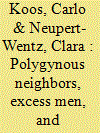

|
|
|
|
|
| Summary/Abstract |
We argue that polygyny creates a social imbalance where few, economically well-off men marry many wives and many poor men marry late or never. By definition, polygyny produces what we refer to as “excess men.” In order to gain material wealth, excess men are likely to raid, plunder, and rob neighboring ethnic groups. We test this hypothesis with georeferenced data on polygyny and intergroup conflict in rural Africa and find strong support. Drawing on Afrobarometer survey data, we explore the underlying mechanisms and find that young men who belong to polygynous groups feel that they are treated more unequally and are readier to use violence in comparison to those belonging to monogamous groups. Our article makes an important contribution to the peace, conflict, and development literature by emphasizing a fundamental aspect of human life: marriage and family.
|
|
|
|
|
|
|
|
|
|
|
|
|
|
|
|
| 7 |
ID:
173781


|
|
|
|
|
| Summary/Abstract |
The literature on economic statecraft has long focused on the effectiveness of foreign aid and trade as tools of inducement. However, existing scholarship largely neglects the role played by government procurement. By choosing to purchase goods or hire labor in foreign states, governments can provide economic benefits for strategic ends. The United States in particular leverages its defense procurement as a foreign policy tool. We introduce a new data set of US government procurement using information on all contracts executed overseas from 2000 to 2015. We develop a typology of how states use procurement to achieve foreign policy goals—power projection, counterinsurgency, and development—and provide descriptive statistics to explore variation in spending across countries and over time. We illustrate the power of the contract data by using it to code US military access in Africa, assess the relationship between spending and economic growth, and test whether economic inducements can buy influence.
|
|
|
|
|
|
|
|
|
|
|
|
|
|
|
|
| 8 |
ID:
173778


|
|
|
|
|
| Summary/Abstract |
Under what conditions do rebel organizations control territory during civil war? How do civilians influence the distribution of territorial control? This article introduces a civilian agency theory, emphasizing community collective action capacity (CAC) defined by underlying social network structure, to complement existing explanations of territorial control. I argue communities with greater CAC mobilize information and resources more efficiently, increasing belligerents’ incentives to control territory. However, CAC also increases community bargaining power to demand costly investments in governance, partially offsetting these gains. CAC increases rebel control in areas of state neglect. But, as state service provision increases, communities leverage CAC to demand prohibitively costly rebel governance, deterring rebel control. This article tests the theory in the context of the communist insurgency in the Philippines, using military intelligence reports from 2011 to 2014 to measure village-level communist insurgent territorial control and a household-level census (2008–2010) to measure village CAC. Interviews with village elders in Eastern Mindanao illustrate causal mechanisms and explore alternative explanations.
|
|
|
|
|
|
|
|
|
|
|
|
|
|
|
|
| 9 |
ID:
173777


|
|
|
|
|
| Summary/Abstract |
Does religious behavior always promote hostility toward members of other faiths? This article suggests that the relationship between personal religious behavior and religious tolerance is not so simple. Even in the Arab World, frequently cited as a center of religious piety and intolerance, different forms of religious behavior have markedly different effects on attitudes toward minority sects. Using both observational and experimental data from across the Arab World as well as an original nationally representative survey conducted in Lebanon in 2013 and 2014, I argue that while communal religious practice does indeed tend to promote intolerant attitudes, personal prayer has precisely the opposite effect. These findings indicate that the traditional assumption that piety invariably leads to intolerance should be rethought. Even in one of the most sectarian environments in the world, private religious behavior can have a substantial pro-tolerance effect.
|
|
|
|
|
|
|
|
|
|
|
|
|
|
|
|
| 10 |
ID:
173780
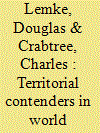

|
|
|
|
|
| Summary/Abstract |
Territorial contenders are political entities that control territory but differ from sovereign states in that they lack diplomatic recognition as legal members of the international system. One consequence of this difference is that international relations data sets have historically excluded information about them. And yet, as evidenced by the Islamic State’s impact on politics in the Middle East and beyond, territorial contenders are important actors in the international system. In this article, we introduce a new data set of territorial contenders, compare territorial contenders to other categories of territorial nonstate actors, explore how the presence of territorial contenders affects the probabilities of civil war and state failure, illustrate the conditions under which territorial contenders are more likely to emerge, and discuss a series of studies now possible given the existence of this new data set.
|
|
|
|
|
|
|
|
|
|
|
|
|
|
|
|
| 11 |
ID:
173773


|
|
|
|
|
| Summary/Abstract |
Nonviolent resistance can be a powerful tool for ordinary civilians to transform their governments; however, not all nonviolent movements end in success and many ultimately escalate into violent conflicts. To understand this escalatory process, I begin with the premise that social movements are not unitary actors but a collection of groups with varied preferences on goals and tactics. I argue that escalation is likely when movements have violence-wielding groups among their varied factions, as these groups deal in violence, believe in its utility, and can make the strategic decision to engage in violence as needed. I argue this is particularly likely when the campaign fails to make progress using nonviolent channels, suggesting that nonviolent tactics will not be successful to achieve the group’s goals. Expectations are tested using the Nonviolent and Violent Campaigns and Outcomes data and the case of Algeria’s escalation from a nonviolent movement to brutal civil war, and results are generally supportive.
|
|
|
|
|
|
|
|
|
|
|
|
|
|
|
|
| 12 |
ID:
173774
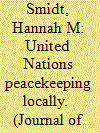

|
|
|
|
|
| Summary/Abstract |
United Nations peacekeeping operations (UN PKOs) increasingly engage with local communities to support peace processes in war-torn countries. Yet, while existing research tends to focus on the coercive and state-building functions of UN PKOs, their concrete local activities with community leaders and populations remain, empirically and theoretically, understudied. Thus, this study investigates how peacekeepers’ community-based intergroup dialogue activities influence communal violence. It argues that facilitating dialogue between different communal identity-based groups locally can revive intergroup coordination and diminish negative biases against other groups, thereby reducing the risk of communal conflict escalation. This argument is tested using a novel data set of intergroup dialogue activities organized by the UN PKO in Côte d’Ivoire across 107 departments from October 2011 to May 2016. Bivariate probit and matching address the nonrandom assignment of these interventions. The analyses provide robust evidence that the UN PKO mitigated communal violence by organizing intergroup dialogues.
|
|
|
|
|
|
|
|
|
|
|
|
|
|
|
|
|
|
|
|
|